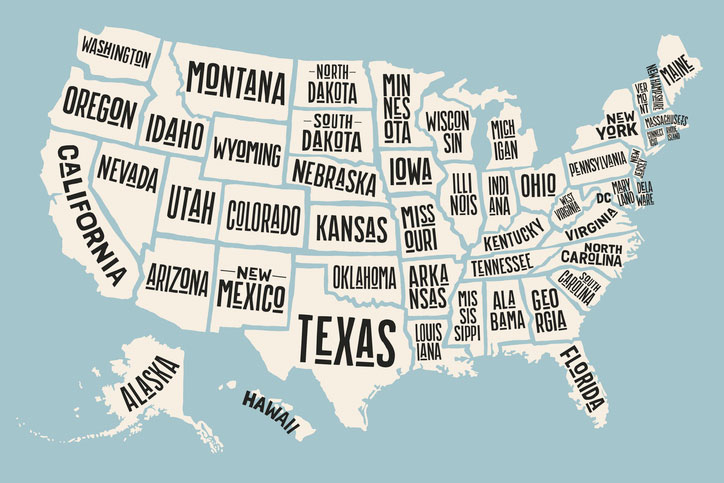Written by Dr. Emily R. Thornton, PhD, LCADC , Last Updated: November 6, 2025
Every state requires substance abuse counselors to meet specific certification requirements. Most states use exams from either NAADAC (National Association for Alcoholism and Drug Abuse Counselors) or IC&RC (International Certification and Reciprocity Consortium). State credentialing boards set education and experience requirements, while these national organizations provide standardized exams. You must satisfy both state requirements and pass the appropriate national exam to practice legally.
Table of Contents
- The Two Players in Substance Abuse Counselor National Certification
- Which Certification Exams Does My State Recognize?
- How Certification Agencies Influence State Education Requirements
- How Certification Agencies Influence State Experience Hour Requirements
- Standard Supervised Experience Requirements Found in All States
- Understanding Reciprocity: Moving Your Certification Between States
- Certification Costs and Timeline
- Frequently Asked Questions
Each state has its own substance use disorder (SUD) counselor credentialing requirements and processes. In most states, you'll go through an official government licensing agency to earn your credentials, no different than social workers, mental health counselors, and marriage and family therapists. In others, you go through one or more state-level non-governmental professional associations that have been delegated the authority to grant credentials that local employers and the broader substance use disorder and human services professional community recognize.
The legal authority to practice substance abuse counseling can only be granted at the state level. National certification alone won't get it done.
Regardless of what type of credentialing body grants the legal right to practice in your state, one of these two big national organizations will play a part in every SUD counselor's professional journey in every state:
- The National Association for Alcoholism and Drug Abuse Counselors (NAADAC)
- The International Certification and Reciprocity Consortium (IC&RC)
In this guide, we'll cover what you need to know about both, which states are aligned with NAADAC or IC&RC standards, and the exact role that organization will play in the state credentialing process you end up going through.
Important: Certification requirements vary by state and change over time. Always verify current requirements with your state's official credentialing board before making education or career decisions.

The Two Players in Substance Abuse Counselor National Certification

While the International Certification and Reciprocity Consortium (IC&RC) and the National Association for Alcoholism and Drug Abuse Counselors (NAADAC) are different organizations, they share some similarities. They both offer exams that states use to certify new counselors.
They also set general standards that states often look to when establishing minimum requirements that counselors must meet. This includes everything from degree level and specific curriculum components to the number of supervised practice hours it takes to be credentialed at different levels.
IC&RC - International Certification and Reciprocity Consortium
Every state in the US is home to a chapter of the IC&RC except for Alaska. They also have chapters in Canada, Asia, Europe, and the Caribbean. The majority of jurisdictions in the US have adopted IC&RC policies and use their tests to certify new counselors.
By helping so many jurisdictions develop counselor certification requirements, the IC&RC aims to make requirements more uniform across the country. This helps counselors transfer their certifications to other jurisdictions and go where they're needed most.
NAADAC - National Association for Alcoholism and Drug Abuse Counselors
The NAADAC has chapters in all 50 states as well as in Antigua and Barbuda and Cyprus. While more states have adopted IC&RC policies than NAADAC policies, the NAADAC prides itself on its large professional network that provides support for counselors while being active in local and national policy issues.
NAADAC vs IC&RC: Quick Comparison
| Feature | NAADAC | IC&RC |
|---|---|---|
| State Coverage | All 50 states have chapters | 49 states (all except Alaska) |
| Exam Recognition | 13 states (6 exclusive, 7 dual acceptance) | 44 states (27 exclusive, 17 dual acceptance) |
| National Certification | Available independent of state | Only through state affiliates |
| Reciprocity Focus | National standards may exceed state requirements | Dedicated reciprocity framework for transfers |
| Professional Network | Strong advocacy and professional development | Focus on standardization and portability |
| Best For | Professional networking, staying in one state | Geographic mobility, multi-state practice |
Which Certification Exams Does My State Recognize?

In pretty much every state, you'll have to pass an exam before you become an SUD counselor. Most states don't make up their own exams. Instead, they typically use exams created by the NAADAC or the IC&RC.
NAADAC Certification Exams
The NAADAC has three main counselor exams:
- The National Certified Addiction Counselor, Level I (NCAC I) Exam: An exam for entry-level counselors
- The National Certified Addiction Counselor, Level II (NCAC II) Exam: An exam for mid-level to advanced counselors
- The Master Addiction Counselor (MAC) Exam: An exam for highly-advanced counselors who often provide clinical services and practice independently
IC&RC Certification Exams
The IC&RC also has three main counselor exams designed for counselors at different levels:
- The Alcohol and Drug Counselor (ADC) Exam: Entry to mid-level certification
- The Advanced Alcohol and Drug Counselor (AADC) Exam: Advanced practice certification
- Clinical Supervisor (CS) Exam: For experienced counselors supervising others
According to a report about the SUD counselor workforce published by the US Department of Health and Human Services, 27 states only accept IC&RC exams. Six states only accept NAADAC exams. The remainder accept exams from both organizations.
While all states use these exams, each state sets their own standards for education and experience requirements that may diverge from the requirements NAADAC and IC&RC have for becoming nationally certified independent of meeting state requirements.
Each state has some variation on the professional titles used for counselors at various levels. Some stick to NAADAC or IC&RC titles while others have their own equivalent title such as substance use disorder counselor, certified addiction counselor, or licensed addiction counselor.
State-by-State Exam Recognition
| State | Exams Accepted |
|---|---|
| Alabama | NAADAC and IC&RC |
| Alaska | NAADAC |
| Arizona | NAADAC and IC&RC |
| Arkansas | IC&RC |
| California | IC&RC |
| Colorado | NAADAC |
| Connecticut | IC&RC |
| Delaware | IC&RC |
| Florida | IC&RC |
| Georgia | NAADAC and IC&RC |
| Hawaii | IC&RC |
| Idaho | IC&RC |
| Illinois | IC&RC |
| Indiana | NAADAC and IC&RC |
| Iowa | IC&RC |
| Kansas | NAADAC |
| Kentucky | IC&RC |
| Louisiana | IC&RC |
| Maine | IC&RC |
| Maryland | NAADAC and IC&RC |
| Massachusetts | IC&RC |
| Michigan | IC&RC |
| Minnesota | NAADAC and IC&RC |
| Mississippi | IC&RC |
| Missouri | IC&RC |
| Montana | NAADAC |
| Nebraska | IC&RC |
| Nevada | IC&RC |
| New Hampshire | IC&RC |
| New Jersey | IC&RC |
| New Mexico | NAADAC |
| New York | IC&RC |
| North Carolina | IC&RC |
| North Dakota | NAADAC |
| Ohio | IC&RC |
| Oklahoma | IC&RC |
| Oregon | NAADAC |
| Pennsylvania | IC&RC |
| Rhode Island | IC&RC |
| South Carolina | NAADAC |
| South Dakota | IC&RC |
| Tennessee | NAADAC |
| Texas | IC&RC |
| Utah | NAADAC and IC&RC |
| Vermont | IC&RC |
| Virginia | NAADAC and IC&RC |
| Washington | NAADAC |
| West Virginia | IC&RC |
| Wisconsin | NAADAC |
| Wyoming | NAADAC |
States That Accept Both Exams: Choosing a Certification That's Right for You
If you live in a state that has IC&RC and NAADAC affiliates that both offer certification, which one you choose to get certified through depends on one major factor: your own career goals.
If you're planning on moving to another state or at least want to be able to later, getting your counselor certification through the IC&RC might be a good bet. More states accept IC&RC exams than NAADAC exams. On top of that, the IC&RC is focused more on making licenses transferable to other jurisdictions than the NAADAC.
That being said, transfer policies vary from state to state. No matter what state you move from and to, you'll likely have to go through a reciprocity process, which is the process by which certification boards determine whether a counselor from another state meets their own standards.
On the other hand, you can become nationally certified through the NAADAC without going through a state affiliate. Because NAADAC national certification standards are often higher or equal to state standards, national certification might mean you can qualify for certification in additional states that accept NAADAC exams. On top of that, the NAADAC also offers career services, training opportunities, and conferences to its members. If you'd like to focus on networking, the NAADAC may be able to help.
How Certification Agencies Influence State Education Requirements

Passing an exam is likely only one requirement you'll have to meet to become an SUD counselor in your state. Before you can even register for your exam, you'll have to get all or most of the education requirements out of the way first.
The minimum education requirements you need to meet largely come down to the level of certification you're seeking. Mid-level credentials in most states require an associate or bachelor's degree, while advanced certification for independent practitioners most often require a master's. Setting those requirements is a function of your state credentialing body.
At each credential level, those requirements are also at least influenced by the exam your state recognizes, either the NAADAC exam or the IC&RC exam. In states where either exam is accepted, you'll usually find the state goes with the lesser degree requirement.
In all cases, degree programs in each state are typically built around helping students meet the requirements set by the state credentialing body.
Education Requirements in States That Only Accept NAADAC Exams
In states that just accept NAADAC exams, state credentialing bodies are most often NAADAC affiliates. This means they're members of the NAADAC network and use NAADAC certification requirements as guidelines for their own requirements. Some states' certification boards aren't necessarily NAADAC affiliates but just look to the NAADAC for guidance.
The NAADAC has straightforward education requirements. Applicants typically need a certain level of degree, whether a certificate, bachelor's, or master's in substance abuse counseling or related field.
On top of that, applicants also need to complete a certain number of education hours about substance use disorder-related topics, sometimes beyond what is included in the degree program if the degree wasn't expressly built to satisfy state requirements. Additional courses can typically be completed through a college or seminars, workshops, and classes offered by approved organizations.
| Certification Level | Minimum Degree Required | Number of SUD Education Hours Required |
|---|---|---|
| National Certified Addiction Counselor, Level I (NCAC I) | High school diploma or GED | 270 |
| National Certified Addiction Counselor, Level II (NCAC II) | Bachelor's degree in an SUD or counseling-related subject | 450 |
| Master Addiction Counselor (MAC) | Master's degree in an SUD or counseling-related subject | 500 |
States with NAADAC-affiliated certification agencies typically follow these guidelines pretty closely. Some states add their own education requirements. For example, many require students to take classes on specific subjects like domestic violence, HIV, and suicide prevention.
In some states aligned with NAADAC standards, minimum requirements are less rigorous than the ones set for national certification, especially when it comes to meeting supervised experience hour requirements. In these cases, it's possible to simply go all-in on national certification since your state credentialing body will recognize it as exceeding state requirements. Your legal authorization to practice still comes from the state credentialing authority in this case.
Education Requirements in States That Only Accept IC&RC Exams
The IC&RC doesn't enforce strict national guidelines about counselor education requirements. They generally let their local affiliates establish their own requirements. This means that requirements vary pretty widely between states that only accept IC&RC exams.
| Certification Level | Minimum Degree Required | Number of SUD Education Hours Required |
|---|---|---|
| Alcohol and Drug Counselor (ADC) | High school diploma or GED (Associate degree or bachelor's degree in some states) | 150 to 350 hours |
| Advanced Alcohol and Drug Counselor (AADC) | Master's degree (Bachelor's degree in some states) | 180 to 350 hours |
| Clinical Supervisor (CS) | Master's degree | Approximately 30 hours of clinical supervisor education in addition to other requirements |
While this may seem to make counselor education standards a bit confusing, this system has certain advantages. Perhaps the most important one is that states can establish standards based on their needs and resources. For example, some states don't have very many college-level counselor education programs. Requiring a college degree for certification would likely mean there wouldn't be many new professionals entering the workforce.
If you're in an IC&RC state that doesn't require all counselors to have some sort of degree, there's another factor to consider that may necessitate earning a degree anyway: employer education standards. Some employers prefer counselors with at least an associate degree or bachelor's degree for entry to mid-level positions.
If you're looking for high-level clinical or administrative positions, you may even want to pursue a master's degree at some point in your career.
Another important thing to consider in IC&RC states is that some require applicants to have degrees in SUD counseling or related subjects like social work, addiction studies, and behavioral health. In others, a degree in any subject qualifies as long as you complete the required number of SUD-specific education hours.
How Certification Agencies Influence State Experience Hour Requirements

Aside from education, another important requirement when becoming a SUD counselor is earning enough supervised practice hours. These are hours in which you counsel clients, perform documentation and administrative duties, and carry out other tasks under the guidance of an experienced professional.
When it comes time to pursue your own counselor certification, supervised experience hour requirements are extremely important to pay attention to. This is because there is a lot of variance between states regardless of whether the NAADAC or IC&RC has the most influence in the state.
Supervised Practice Hour Requirements in States That Only Accept NAADAC Exams
If you want to become certified as a counselor directly through the NAADAC and not your local state affiliate, you'll have to complete 6,000 supervised practice hours no matter what level of certification you're pursuing. Most states that require the NAADAC exam don't adhere to this requirement. In fact, most have lower requirements.
For example, in Colorado, counselors must go through a state-run agency that only accepts NAADAC exams. It only takes 2,000 supervised experience hours to qualify for a full substance use disorder counselor license. About 2,000 to 4,000 hours is a relatively common requirement in NAADAC states for all levels of licensure.
No matter what the specific hour requirement is in your state, if it's a state influenced mostly by NAADAC policies, you'll likely spend your supervision hours working on nine skill areas outlined in NAADAC standards:
- Admissions, intake, screening, and client orientation
- Clinical assessment
- Treatment planning
- Group, family, and individual counseling (includes crisis intervention techniques and client education)
- Documentation
- Case management
- Discharge planning and continuing care
- Your ethical and legal responsibilities including professional development
- The psychopharmacology and physiology of substance use disorders
In some states, you might have to spend a certain number of hours on each skill group. Your supervisor will likely submit a final assessment of your mastery of each area. You'll also be tested on your knowledge of each skill area on the final exam.
Supervised Practice Hour Requirements in States That Only Accept IC&RC Exams
In states that require IC&RC exams, supervised practice hours vary widely, often more than in NAADAC states. Once again, this is because the IC&RC typically lets their state affiliates determine their own certification requirements.
| Certification | Supervised Practice Hours Required |
|---|---|
| Alcohol and Drug Counselor (ADC) | 4,000 to 6,000 hours |
| Advanced Alcohol and Drug Counselor (AADC) | 2,000 to 10,000 hours |
| Clinical Supervisor (CS) | Approximately 4,000 hours of supervision practice in addition to other requirements |
Like the NAADAC, the IC&RC breaks down counselors' duties into a few specific skill areas. While there is some overlap, the IC&RC's counselor skill areas are broken up slightly differently. Counselors preparing for different levels of certification have different skill sets to master.
If you're applying for Alcohol and Drug Counselor certification, you'll need to work on four domains:
- The science behind substance use disorders and common co-occurring disorders: This domain covers identifying risk factors, assessing clients, and helping them overcome health and mental health problems that often come with substance use disorders.
- Using evidence-based methods to screen and assess clients: This includes administering and interpreting tests, using interviewing techniques, and making treatment plans based on your assessment.
- Counseling and referrals: In addition to including group, family, and individual counseling techniques, this domain also includes discharge planning and working with other professionals as needed.
- Ethical and Legal Duties: This includes logistical skills such as record-keeping and more nuanced skills such as setting appropriate boundaries and maintaining an inclusive counseling environment.
If you're applying for Advanced Alcohol and Drug Counselor, you'll need to work on the same domains but will likely practice more advanced skills. If you're applying for the Master Addiction Counselor certification, you'll also work on assessing other counselors and developing and evaluating treatment programs.
In any case, you'll be tested on these domains on your final exam and your supervisor will likely evaluate you based on them.
Standard Supervised Experience Requirements Found in All States
No matter what kind of exam your own state accepts, completing supervision hours isn't always just a matter of finding a place to work and working enough hours. For your supervision hours to count, your supervision experience may have to meet other requirements as well.
During supervision, you may need to:
- Work directly with your supervisor for a set number of hours: During your supervised work experience, you may not always have to work directly under your supervisor. Some states say applicants should work directly with their supervisors for a certain amount of time, usually a few hundred hours. This is so they can take notes on your progress and give in-depth guidance.
- Work under a specific type of supervisor: In most states, your supervisor needs to be an experienced, licensed or certified professional. While this typically includes certified SUD counselors, some states allow applicants to work under psychologists, social workers, child and family therapists, and other behavioral professionals as well.
- Perform certain tasks for your hours to count: State regulations vary widely on what actually counts as supervised experience. Some say that as long as applicants are doing duties a counselor would do (including paperwork and meetings), then all hours count. Some are a little more strict. In such states, only direct patient contact hours or hours spent working directly with your supervisor count.
- Work in a specific capacity: Depending on where you live, your local board may count hours spent working as a volunteer towards your supervised experience hour requirement. Not all states follow that rule. In some, you might have to be a paid employee or complete a practicum while you earn your degree for your hours to count.
- Get a training license: In states with strict counselor certification laws, you may have to become an SUD counselor trainee or associate before starting your supervised experience. This typically includes completing some of your education hours and undergoing a background check.
Understanding Reciprocity: Moving Your Certification Between States
One of the more complicated concepts you'll confront when planning your career is understanding how credentials transfer when you move to a different state. This process is called reciprocity, and it's rarely automatic.
Reciprocity is the process by which a state credentialing board evaluates whether a counselor certified in another state meets their own requirements. Even if both states use the same exam (NAADAC or IC&RC), education and experience hour requirements can differ significantly.
How IC&RC Facilitates Reciprocity
The IC&RC was specifically designed with reciprocity in mind. The consortium works to standardize requirements across member states, making it easier to transfer credentials. If you're certified through an IC&RC affiliate in one state, moving to another IC&RC state typically involves:
- Submitting your certification documentation to the new state's board
- Meeting any additional state-specific requirements (ethics courses, state law exams)
- Paying application and transfer fees
- Possibly completing supplemental supervision hours if your original state had lower requirements
NAADAC National Certification and Mobility
NAADAC's approach to reciprocity is different. By earning national certification through NAADAC (independent of your state affiliate), you may meet or exceed requirements in multiple NAADAC states. This can simplify the transfer process because your national credential demonstrates you've met rigorous standards.
States that accept both NAADAC and IC&RC exams typically have the most flexible reciprocity policies, giving you more options when relocating.
What to Expect During Reciprocity
Don't expect instant approval when moving states. The reciprocity process typically takes several weeks to months and may require:
- New background checks and fingerprinting
- Verification of your education credentials
- Proof of supervised experience hours
- State-specific ethics or jurisprudence exams
- Additional coursework if your original state had lower requirements
- Application fees ranging from $100 to $500
Before relocating, contact the credentialing board in your target state at least six months in advance to understand their specific reciprocity requirements and timeline.
Certification Costs and Timeline
Understanding the financial investment and time commitment required for certification helps you plan your career path realistically.
Typical Certification Costs
The total cost to become certified as a substance abuse counselor varies by state and credential level, but expect to budget for:
| Expense Category | Entry-Level (NCAC I / ADC) | Mid-Level (NCAC II / AADC) | Advanced (MAC / CS) |
|---|---|---|---|
| Education (degree or courses) | $3,000 - $15,000 | $20,000 - $60,000 | $30,000 - $80,000 |
| Exam application fee | $75 - $200 | $150 - $300 | $200 - $400 |
| Exam fee | $150 - $250 | $200 - $350 | $250 - $450 |
| State application fee | $50 - $200 | $100 - $300 | $150 - $400 |
| Background check | $25 - $75 | $25 - $75 | $25 - $75 |
| Annual renewal fee | $50 - $150 | $75 - $200 | $100 - $300 |
National certification through NAADAC typically costs an additional $200 to $400 on top of state requirements. Many states accept national certification in lieu of state certification, potentially saving money.
Timeline to Certification
The time it takes to become fully certified depends on your starting point and the credential level you're pursuing:
Entry-Level Certification (NCAC I / ADC):
- Education: 6 months to 2 years (270-350 hours of coursework)
- Supervised experience: 2 to 3 years full-time (4,000-6,000 hours)
- Application and exam: 2 to 4 months
- Total: 2.5 to 5 years from start to certification
Mid-Level Certification (NCAC II / AADC):
- Education: 2 to 4 years (associate or bachelor's degree)
- Supervised experience: 1 to 3 years (2,000-6,000 hours, varies by state)
- Application and exam: 2 to 4 months
- Total: 3 to 7 years from start to certification
Advanced Certification (MAC / CS):
- Education: 2 to 3 years beyond bachelor's (master's degree)
- Supervised experience: 1.5 to 3 years (3,000-6,000 hours post-master's)
- Application and exam: 2 to 4 months
- Total: 6 to 10+ years from initial education to advanced certification
These timelines assume continuous progress. Many counselors work while completing requirements, which can extend the timeline but provides income during the process.
Frequently Asked Questions
What's the difference between NAADAC and IC&RC certification?
NAADAC and IC&RC are both national organizations that provide certification exams for substance abuse counselors, but they differ in approach. IC&RC focuses on standardization and reciprocity across states (49 states participate), making it easier to transfer credentials. NAADAC offers national certification independent of state affiliation and emphasizes professional networking and advocacy. More states accept IC&RC exams (44 states) than NAADAC exams (13 states), though some accept both.
Can I transfer my certification to another state?
Yes, but not automatically. You'll need to go through a reciprocity process where the new state's credentialing board evaluates whether you meet their requirements. IC&RC certification typically transfers more easily between IC&RC states. NAADAC national certification can help if moving to another NAADAC state. The process usually takes several weeks to months and may require additional coursework, state-specific exams, or supplemental supervision hours.
Do I need national certification or just state certification?
You need state-level authorization to practice legally. National certification can help you meet state requirements and makes interstate mobility easier. In NAADAC states, pursuing national certification through NAADAC may exceed state requirements, giving you more career flexibility. In IC&RC states, certification comes through state affiliates. If you plan to move states or want the strongest credential, consider national certification if available in your pathway.
Which certification is better, NAADAC or IC&RC?
Neither is inherently better. Your choice depends on your career goals and state. Choose IC&RC if you prioritize geographic mobility (more states accept IC&RC exams) or plan to move frequently. Choose NAADAC if you value professional networking, staying in one state, or want national certification independent of state affiliation. If your state accepts both, consider IC&RC for portability or NAADAC for networking and professional development opportunities.
How long does the certification process take?
Entry-level certification typically takes 2.5 to 5 years, including education (6 months to 2 years) and supervised experience (2 to 3 years at 4,000-6,000 hours). Mid-level certification takes 3 to 7 years with a bachelor's degree and 2,000-6,000 supervised hours. Advanced certification requires 6 to 10+ years including a master's degree and extensive post-degree supervision. Many people work in the field while completing requirements, extending the timeline but providing income.
How much does substance abuse counselor certification cost?
Total costs vary by credential level. Entry-level certification costs $3,500-$15,000 including education, exams, and fees. Mid-level certification with a bachelor's degree costs $20,000-$60,000. Advanced certification with a master's degree costs $30,000-$80,000. Ongoing costs include annual renewal fees ($50-$300) and continuing education. Exam fees alone range from $150-$450 depending on credential level.
Can I get certified without a college degree?
Yes, in some states. Entry-level NAADAC certification (NCAC I) requires only a high school diploma plus 270 hours of SUD-specific education. Some IC&RC states also allow high school diploma plus specialized coursework for ADC certification. However, many employers prefer candidates with at least an associate degree, and higher-level positions require bachelor's or master's degrees. Check your specific state requirements and local employer preferences.
What happens if I fail the certification exam?
You can retake the exam, but policies vary by organization and state. Most allow multiple attempts with waiting periods between tests (typically 90 days). You'll need to pay the exam fee again for each attempt. If you fail multiple times, you may be required to complete additional education or supervision before retesting. Both NAADAC and IC&RC provide study materials and many states offer exam preparation courses to improve your chances of passing.
Key Takeaways
- State credentialing boards grant legal authority to practice, while NAADAC and IC&RC provide the standardized exams most states require
- IC&RC certification is accepted in 44 states and emphasizes reciprocity for interstate mobility, while NAADAC is recognized in 13 states and offers national certification with strong professional networking
- Education requirements range from high school diploma plus 270 hours (entry-level) to master's degree plus 500 hours (advanced certification), varying by state and credential level
- Supervised experience hours range from 2,000 to 10,000 hours depending on state and certification level, with specific requirements about supervisor qualifications and allowable activities
- Reciprocity is not automatic when moving states. Plan ahead by contacting your target state's board at least six months before relocating to understand transfer requirements
- Total certification costs range from $3,500 for entry-level to $80,000+ for advanced credentials, while timelines span 2.5 to 10+ years depending on your starting point and chosen pathway
Ready to Start Your Certification Journey?
Understanding national certification is just the beginning. Every state has unique requirements that affect your education, supervision, and exam choices. Explore your state's specific pathway to ensure you're on the right track from day one.
Find Your State's RequirementsThe Bottom Line: You Need to Investigate Your State's Certification Requirements
The IC&RC and NAADAC are both highly-recognized and highly-respected substance abuse counselor certification agencies. While IC&RC exams are accepted in more states than NAADAC exams, both organizations have local affiliates across the country that support the recovery workforce, advocate for equitable access to treatment, and educate their communities. Certification through either organization can be a great way to become involved in such efforts.
Of course, the core function of substance abuse counselor certification is two-fold. It's there for your own professional preparation and advancement, but also to ensure you meet the education and experience standards your state has set to ensure the safe and effective delivery of counseling and other treatment services to your clients.
That means you'll always need to have the official approval of your state credentialing authority to make your way in the field. So the wisest place to start is by investigating your own state's requirements for becoming a substance use disorder counselor.








